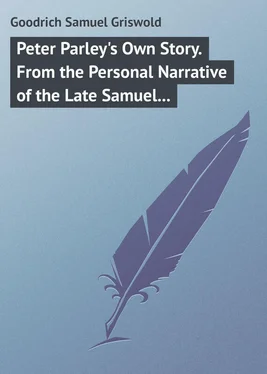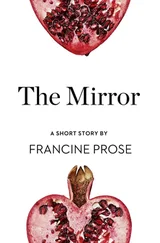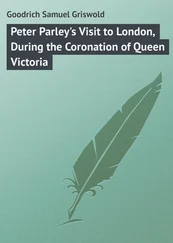Samuel Goodrich - Peter Parley's Own Story. From the Personal Narrative of the Late Samuel G. Goodrich, («Peter Parley»)
Здесь есть возможность читать онлайн «Samuel Goodrich - Peter Parley's Own Story. From the Personal Narrative of the Late Samuel G. Goodrich, («Peter Parley»)» — ознакомительный отрывок электронной книги совершенно бесплатно, а после прочтения отрывка купить полную версию. В некоторых случаях можно слушать аудио, скачать через торрент в формате fb2 и присутствует краткое содержание. Издательство: Иностранный паблик, Жанр: foreign_language, foreign_prose, на английском языке. Описание произведения, (предисловие) а так же отзывы посетителей доступны на портале библиотеки ЛибКат.
- Название:Peter Parley's Own Story. From the Personal Narrative of the Late Samuel G. Goodrich, («Peter Parley»)
- Автор:
- Издательство:Иностранный паблик
- Жанр:
- Год:неизвестен
- ISBN:нет данных
- Рейтинг книги:5 / 5. Голосов: 1
-
Избранное:Добавить в избранное
- Отзывы:
-
Ваша оценка:
- 100
- 1
- 2
- 3
- 4
- 5
Peter Parley's Own Story. From the Personal Narrative of the Late Samuel G. Goodrich, («Peter Parley»): краткое содержание, описание и аннотация
Предлагаем к чтению аннотацию, описание, краткое содержание или предисловие (зависит от того, что написал сам автор книги «Peter Parley's Own Story. From the Personal Narrative of the Late Samuel G. Goodrich, («Peter Parley»)»). Если вы не нашли необходимую информацию о книге — напишите в комментариях, мы постараемся отыскать её.
Peter Parley's Own Story. From the Personal Narrative of the Late Samuel G. Goodrich, («Peter Parley») — читать онлайн ознакомительный отрывок
Ниже представлен текст книги, разбитый по страницам. Система сохранения места последней прочитанной страницы, позволяет с удобством читать онлайн бесплатно книгу «Peter Parley's Own Story. From the Personal Narrative of the Late Samuel G. Goodrich, («Peter Parley»)», без необходимости каждый раз заново искать на чём Вы остановились. Поставьте закладку, и сможете в любой момент перейти на страницу, на которой закончили чтение.
Интервал:
Закладка:
"What, then," said he, ruminating deeply, "is a noun? But first I must find out what a horse-hair justice is."
Upon this he meditated for some days, but still he was as far as ever from the solution. Now, his father was a man of authority in those parts, and, moreover, he was a justice of the peace. Withal, he was of respectable ancestry, and so there had descended to him a stately high-backed settee, covered with horse-hair. One day, as the youth came from school, pondering upon the great grammatical problem, he entered the front door of the house, and there he saw before him his father, officiating in his legal capacity, and seated upon the old horse-hair settee. "I have found it!" said the boy to himself, greatly delighted – "my father is a horse-hair justice, and therefore a noun!"
Nevertheless, it must be admitted that the world got on remarkably well in spite of this narrowness of the country schools. The elements of an English education were pretty well taught throughout the village seminaries of Connecticut, and, I may add, of New England. The teachers were heartily devoted to their profession: they respected their calling, and were respected and encouraged by the community. They had this merit, that while they attempted little, that, at least, was thoroughly performed.
I went steadily to the Up-town school for three winters; being occupied during the summers upon the farm, and in various minor duties. I was a great deal on horseback, often carrying messages to the neighboring towns of Reading, Wilton, Weston, and Lower Salem, for then the post routes were few, and the mails, which were weekly, crept like snails over hill and valley. I became a bold rider at an early age: before I was eight years old I frequently ventured to put a horse to his speed, and that, too, without a saddle. A person who has never tried it, can hardly conceive the wild delight of riding a swift horse, when he lays down his ears, tosses his tail in air, and stretches himself out in a full race. The intense energy of the beast's movements, the rush of the air, the swimming backward of lands, houses, and trees, with the clattering thunder of the hoofs – all convey to the rider a fierce ecstasy, which, perhaps, nothing else can give. About this period, however, I received a lesson, which lasted me a lifetime.
You must know that Deacon Benedict, one of our neighbors, had a fellow living with him named Abijah. He was an adventurous youth, and more than once led me into tribulation. I remember that on one occasion I went with him to shoot a dog that was said to worry the deacon's sheep. It was night, and dark as Egypt, but Bige said he could see the creature close to the cow-house, behind the barn. He banged away, and then jumped over the fence, to pick up the game. After a time he came back, but said not a word. Next morning it was found that he had shot the brindled cow; mistaking a white spot in her forehead for the dog, he had taken a deadly aim, and put the whole charge into her pate. Fortunately her skull was thick and the shot small, so the honest creature was only a little cracked. Bige, however, was terribly scolded by the deacon, who was a justice of the peace, and had a deep sense of the importance of his duties. I came in for a share of blame, though I was only a looker-on. Bige said the deacon called me a "parsnip scrimmage," but more probably it was a particeps criminis .
But to proceed. One day I was taking home from the pasture a horse that belonged to some clergyman – I believe Dr. Ripley, of Greensfarms. Just as I came upon the level ground in front of Jerry Mead's old house, Bige came up behind me on the deacon's mare – an ambling brute with a bushy tail and shaggy mane. As he approached he gave a chirrup, and my horse, half in fright and half in fun, bounded away, like Tam O'Shanter's mare. Away we went, I holding on as well as I could, for the animal was round as a barrel. He was no doubt used to a frolic of this sort, although he belonged to a doctor of divinity, and looked as if he believed in total depravity. When he finally broke into a gallop he flew like the wind, at the same time bounding up and down with a tearing energy, quite frightful to think of. After a short race he went from under me, and I came with a terrible shock to the ground.
The breath was knocked out of me for some seconds, and as I recovered it with a gasping effort, my sensations were indescribably agonizing. Greatly humbled and sorely bruised, I managed to get home, where the story of my adventure had preceded me. I was severely lectured by my parents, which, however, I might have forgotten, had not the concussion made an indelible impression on my memory, thus perpetuating the wholesome counsel.
When I was about twelve years old, a man by the name of Sackett was employed to keep a high-school, or, as it was then called, an academy. Here I went irregularly for a few weeks, and at a public exhibition I remember to have spoken a piece, upon a stage fitted up in the meeting-house, entitled "Charles Chatterbox." This was the substance of my achievements at Sackett's seminary.
The narrowness of my father's income, and the needs of a large family, induced him to take half-a-dozen pupils to be fitted for college. This he continued for a series of years. It might seem natural that I should have shared in these advantages; but, in the first place, my only and elder brother, Charles A. Goodrich – now widely known by his numerous useful publications – had been destined for the clerical profession, partly by his own predilection, partly by encouragement from a relative, and partly, too, from an idea that his somewhat delicate constitution forbade a more hardy career. To this may doubtless be added the natural desire of his parents that at least one of their sons should follow the honored calling to which father, grandfather, and great-grandfather had been devoted. Hence he was put in training for college. The expenses to be thus incurred were formidable enough to my parents, without adding to them by attempting anything of the kind for me. And, besides, I had manifested no love of study, and evidently preferred action to books. Moreover, it must be remembered, that I was regarded as a born carpenter, and it would have seemed tempting Providence to have set me upon any other career. So, with perfect content on my part, from the age of twelve to fourteen, I was chiefly employed in active services about the house and farm. I could read, write, and cipher; this was sufficient for my ambition, and satisfactory to my parents, in view of the life to which I was apparently destined.
Nevertheless, though my school exercises were such as I have described, I doubtless gathered some little odds and ends of learning about those days, beyond the range of my horn-books. I heard a good deal of conversation from the clergymen who visited us, and, above all, I listened to the long discourses of Lieutenant Smith upon matters and things in general. My father, too, had a brother in Congress, from whom he received letters, documents, and messages, all of which became subjects of discussion. I remember, further, that out of some childish imitation, I thumbed over Corderius and Erasmus – the first Latin books, then constantly in the hands of my father's pupils. I was so accustomed to hear them recite their lessons in Virgil, that
Tityre, tu patulæ recubans sub tegmine fagi—
and
Arma , arms — virumque , and the man — cano , I sing,
were as familiar to my ears as hillery, tillery, zachery zan , and probably conveyed to my mind about as much meaning. Even the first lesson in Greek —
Εν, in – ἀρχή, the beginning – ἠν, was – ὁ λογος, the Word —
was also among the cabalistic jingles in my memory. All this may seem nothing as a matter of education; still, some years after, while I was an apprentice in Hartford, feeling painfully impressed with the scantiness of my knowledge, I borrowed some Latin school-books, under the idea of attempting to master that language. To my delight and surprise, I found that they seemed familiar to me. Thus encouraged, I began, and bending steadily over my task at evening, when my day's duties were over, I made my way nearly through the Latin Grammar and the first two books of Virgil's Æneid . In my poverty of knowledge, even these acquisitions became useful to me.
Читать дальшеИнтервал:
Закладка:
Похожие книги на «Peter Parley's Own Story. From the Personal Narrative of the Late Samuel G. Goodrich, («Peter Parley»)»
Представляем Вашему вниманию похожие книги на «Peter Parley's Own Story. From the Personal Narrative of the Late Samuel G. Goodrich, («Peter Parley»)» списком для выбора. Мы отобрали схожую по названию и смыслу литературу в надежде предоставить читателям больше вариантов отыскать новые, интересные, ещё непрочитанные произведения.
Обсуждение, отзывы о книге «Peter Parley's Own Story. From the Personal Narrative of the Late Samuel G. Goodrich, («Peter Parley»)» и просто собственные мнения читателей. Оставьте ваши комментарии, напишите, что Вы думаете о произведении, его смысле или главных героях. Укажите что конкретно понравилось, а что нет, и почему Вы так считаете.












